

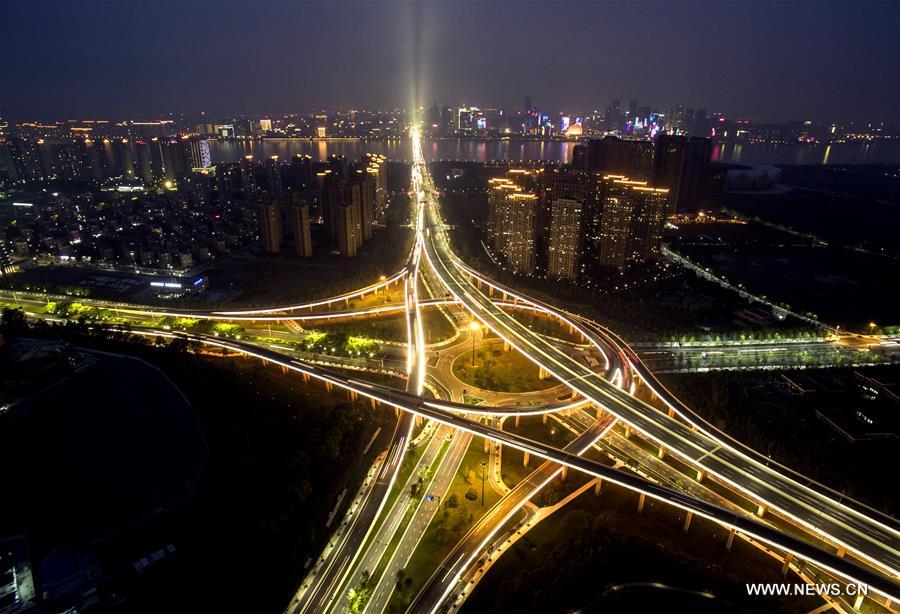
File photo taken on May 24, 2016 shows an aerial view of expressways linking Hangzhou Xiaoshan International Airport at night in Hangzhou, east China's Zhejiang Province. Hangzhou is the host city for the 2016 G20 summit on Sept. 4 and Sept. 5. [Photo/Xinhua]
G20 could not come at a better time. We are living through an unprecedented period of low interest rates and sluggish global growth. Quantitative easing should have increased the price of assets, but interest rates have remained low.
I will attend B20 on 3-4 September in Hangzhou and I am looking for the answer to one question; how to create balanced global growth.
Having lived on three continents, Africa, Europe and Asia, I can see that growth is not balanced and that the result of a growing wealth gap is starting to create global uncertainty which is bad for business.
The situation arriving at the summit, is not as it has ever been in the past. Donald Trump said he'd "Build a Wall" and that is just what many countries are doing. Australia is building a futile trade wall against China. Britain is building a selfish wall against refugees. Isolationism is the order of the day.
Isolationism is the opposite of what the world needs. Wall builders are war-mongers.
I often think that even a self-centred egotistical despot could not drop a bomb on a country where he knows the name of just one inhabitant. Often when I fly over a country, I think of people I have grown up with, conferences I have attended or families I have visited in their homes.
By meeting, countries cease to be political labels or certain coloured flags but become collections of friends; a global family.
The most important part of a conference is not what happens on stage, as that is often rather stilted, but what happens at the tea breaks and over dinner; the conversations on the side-lines when people discuss what they really think.
These intimate exchanges are what cultivate real friendships and where the real value of G20 lies.
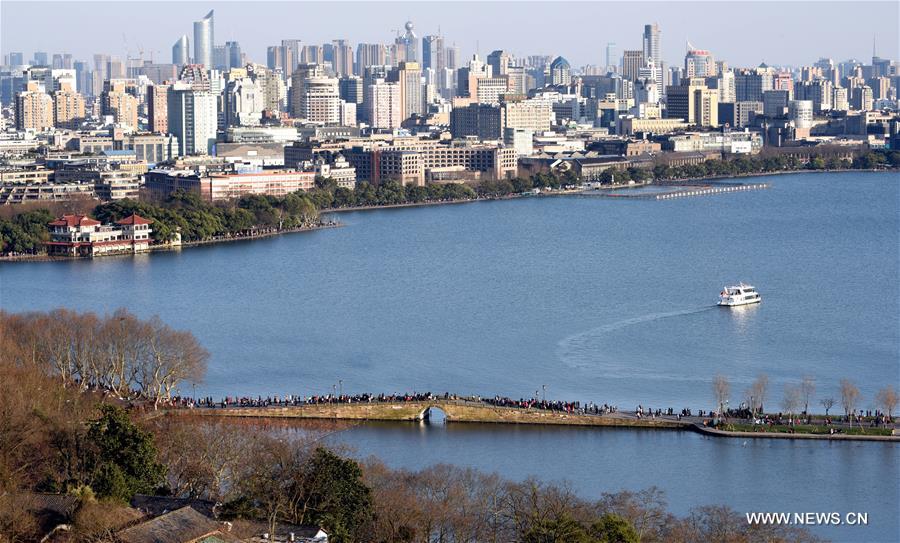
File photo taken on April 27, 2016 shows an aerial view of the West Lake in Hangzhou, east China's Zhejiang Province. Hangzhou is the host city for the 2016 G20 summit on Sept. 4 and Sept. 5. [Photo/Xinhua]
Why Hangzhou?
This is why I think Hangzhou is such an inspired choice of location. The train ride from Hongqiao, the clean air in the mystical wetlands and the serenely landscaped Alibaba campus will no doubt inspire the G20 attendees.
Visiting Alibaba they will see what could happen if you let your mind roam beyond the confines of your national or professional cubicle. You can appreciate the quality of life of those employees with their free bicycles, casual coffee shops and community activities, whatever your personal background. Jack Ma has created a case study of harmonious global connectivity; a world in which people would like to live.
I think real progress will be made on a number of global issues, not because it is an easy time in the world, not because everyone from the G20 nations is the best of friends, but because we are in China.
China has the air of antiquity matched with the modern economic achievements to put petty local differences in perspective. My Grandad for example lived in Shaoyang, in Hunan in rural China in 1945, working peaceably with a German Doctor, because they literally did not know that they were meant to be at war. China can bury your petty local differences in its enveloping scale.
It's easy to read about China's achievements but another thing to really witness them. I take great pleasure in envisaging attendees taking the high speed train. Naturally they will compare it to their own infrastructure and find it wanting.
China is not a country that has just developed for the middle or upper classes. A country which invests in trains invests in equal opportunities for all.
Another famous landmark G20 visitors might encounter is the Hangzhou Bay Bridge. Built with a 3,000 ton crane, this bridge spans 36 kilometres and reduces driving time from Ningbo to Shanghai from four hours to two.
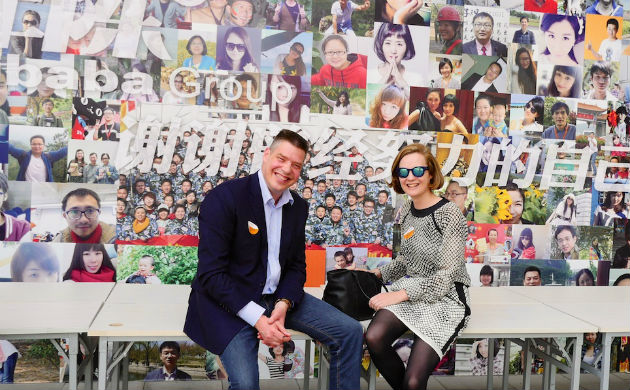
Clare Pearson, right, visits Alibaba's Hangzhou campus with her brother, Robert Pearson, who runs a creative design company in Hangzhou, in April 2015. [Photo provided to People.cn]
Bridging divides
If Chinese structural engineers can achieve these sorts of feats what sort of global issues cannot G20 bridge? Here's a few I would like to see spanned:
1) Bridging the Government/small business divide
2) Bridging the local/migrant divide
3) Bridging the developed/developing divide
4) Bridging the Britain/China divide
1) Government/Small business
To really get the global economy moving we need more SMEs. Government needs to be much more flexible here. Flexible in deciding who can work in which country. Flexible in deciding who can stay in your country for what time. This needs to be a two way street. A foreigner doesn't take a local's job when they arrive in another country. They often create jobs by capitalizing on bicultural synergies hitherto ignored. My brother's British business for example was able to add fifty jobs in the UK when it opened its office in Hangzhou in 2006, because of the sheer enormity of clients in Ningbo. One global Chinese client is worth 200 European clients in revenue. Western companies have to learn this. Building the business bridges in the China century is basic economics.
2) Bridging the local/migrant divide
Governments really have to look into the issue of diverse representation. How can people of second language English, for example, get elected to Parliament which is really just an oversized debating society. Britain is a very diverse country but I did not meet many Chinese in the Commons or Lords on a recent visit. I have noted from working in a business with a diverse board that it is the only way to profitability in a globalized era. You just don't know what you don't know if you don't have someone from that country at the (Cabinet) table. Uni-cultural government may have been justifiable in 1860, but not in 2016.
3) Bridging the developed/developing divide
I am pleased to see that China has invited Laos and some other neighbours to G20. China has unique experience in economic development that need to be shared with the rest of the world. Increasing political extremism is less to do with religion and more to do with lack of economic opportunity. China is an expert in turning wastelands into wonderlands; in irrigating deserts; and in industrializing rural areas. These are the key skills we need today to counter terrorism. If people have the chance to earn a living honestly, they are less likely to be seduced by the offers of extreme sects.
4) Bridging Britain and China
This is Britain's time to act. Why not do something radical like twin every Chinese province with one or two British Counties? Start young with educational bridges and trips between schools. Then build travel bridges. Gradually lower the visa wall between China and the UK. When this happened between Hong Kong and Japan, business between the two countries automatically boomed. Currently the two year visa between China and the UK is very popular. We should issue more ten years visas and hopefully eradicate them altogether in the end.
This will stimulate the economy in a way that is greatly needed post-Brexit, otherwise the UK will face a deepening recession. Relaxed visas should be complemented by more direct flights. The Manchester to Beijing flight by Hainan Air has been a huge hit. Direct flights at good prices should also be opened between Shanghai and Edinburgh and Leeds and Beijing. This will bring with it the students, creative and business connections to build the economic and cultural bridges Britain so badly needs.
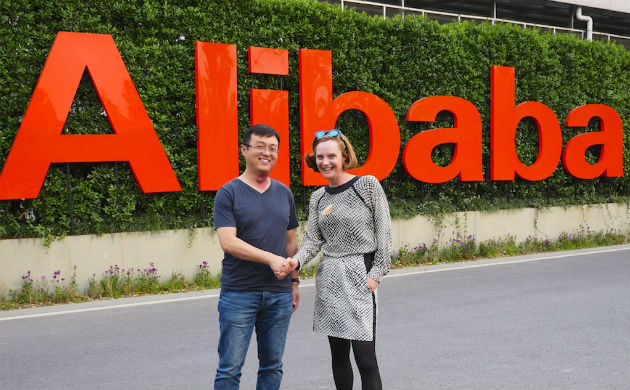
Clare Pearson, right, meets with James Xu, head of international development at Alibaba Hangzhou, in April 2015. [Photo provided to People.cn]
Strong Foundations for global growth
Ultimately I would like to see the UK develop its own bilateral, bi-annual dialogue with China. China is currently focusing on cultural and media industries and these play to the UK's strengths. Our economies are complementary, not competitive, so we should exploit synergies whilst the pound is weak and China has an appetite for global investment. I hope that Britain can act more nimbly on its own and emulate the Strategic economic dialogues which the US and the EU currently enjoy with China.
I will attend B20 with my Chinese boss, Roy Chan. I have worked with him for sixteen years and have witnessed the contribution that Chinese representation can make on a global board. Roughly 20% of the world is Chinese, 6% is European and 4% is American. If only 1% of Chinese (140 M) can afford to invest abroad that is still more than twice the population of the UK. If the trip to Hangzhou will do one thing for the world, it is to remind them that today China is more famous for bridges than walls. Hanghzhou could lay the foundations of bridges to a balanced global economy. G20, China is globalising, are you?
The author is International Development Director at DLA Piper and Chair of the British Chamber of Commerce in China
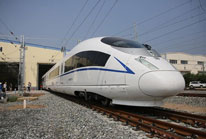 World's fastest bullet train to start operating next month
World's fastest bullet train to start operating next month Huangluo: China's 'long hair village'
Huangluo: China's 'long hair village' Spectacular bridge with one of the tallest piers in the world
Spectacular bridge with one of the tallest piers in the world Magnificent view of Hukou Waterfall
Magnificent view of Hukou Waterfall A glimpse of Stride 2016 Zhurihe B military drill
A glimpse of Stride 2016 Zhurihe B military drill US Navy chief tours Liaoning aircraft carrier
US Navy chief tours Liaoning aircraft carrier Chinese American woman wins Miss Michigan
Chinese American woman wins Miss Michigan Centenarian couple takes first wedding photos
Centenarian couple takes first wedding photos Traditional Tibetan costumes presented during fashion show
Traditional Tibetan costumes presented during fashion show Top 10 livable Chinese cities
Top 10 livable Chinese cities Top 20 hottest women in the world in 2014
Top 20 hottest women in the world in 2014 Top 10 hardest languages to learn
Top 10 hardest languages to learn China’s Top 10 Unique Bridges, Highways and Roads
China’s Top 10 Unique Bridges, Highways and Roads Chinese athletes switch nationality for opportunities, welfare
Chinese athletes switch nationality for opportunities, welfare With another Olympic gold, Lang Ping rekindles national pride
With another Olympic gold, Lang Ping rekindles national pride Who holds the purse strings?
Who holds the purse strings? Chinese author Hao Jingfang wins Hugo Award for Best Novelette with ‘Folding Beijing’
Chinese author Hao Jingfang wins Hugo Award for Best Novelette with ‘Folding Beijing’Day|Week